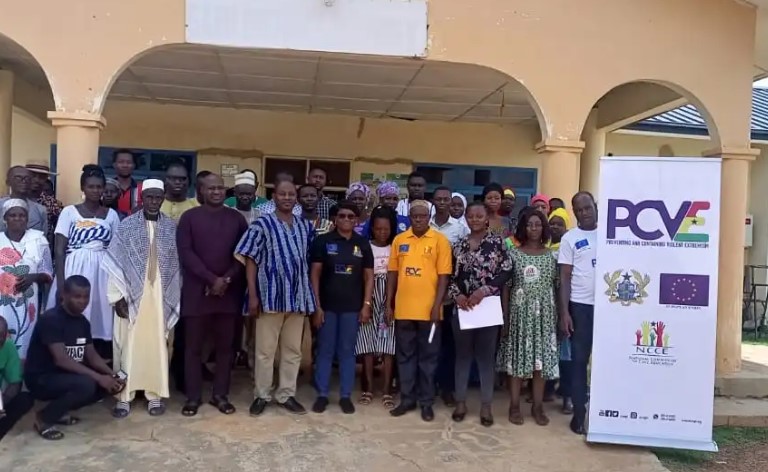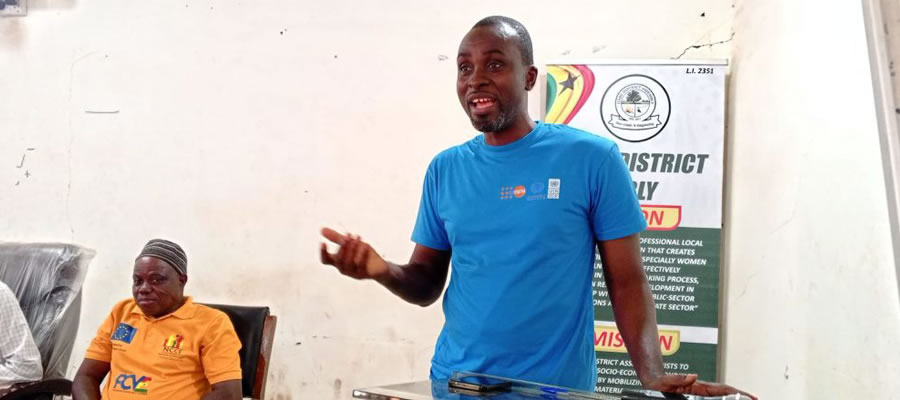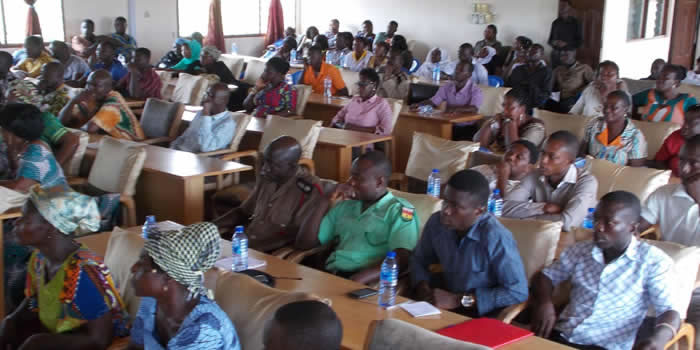

SOCIAL
Garu youth resolve to use non-violence means to resolve differences
Youth groups in the Garu District of the Upper East Region have resolved to employ dialogue and non-violence means to solve differences in the community.

Date Created : 7/4/2023 12:00:00 AM : Story Author : NewsGhana/Ghanadistricts.com
The move is to help deepen the prevailing peace in the area, strengthen the unity that exists among the people, work together to support security agencies in preventing violent extremism and achieve sustainable development.
The youth groups made the commitment at Garu, a town in the district, when the National Commission for Civic Education (NCCE), with funding support from the European Union engaged them in preventing and containing violent extremism in their communities.
The engagement was part of the Commission’s awareness creation and sensitisation efforts dubbed, “Preventing and Containing Violent Extremism (PCVE),” aimed at curbing the crime through the promotion of social cohesion, peace and tolerance in Northern Ghana.
Mr Jackson Saaga, the Chairman of the Groups’ Executives, said various things, including religious convictions, political ideologies and prejudices against specific ethnic groups often served as drivers of these forms of crimes, threatening their communities.
The youth emphasised that ensuring peace and security in their respective communities and the entire country, was the responsibility of all stakeholders and pledged to work together to identify promptly and report suspected activities of violent extremists to the security agencies.
“We have agreed to watch out for suspicious characters that are not known in our communities and report them to lawful agencies or our community leaders.
“We have agreed to share the emergency numbers to our community members such as Police (191), Fire Service (192), Emergency contact (112) and national security (999),” they said.
Mr Samuel Atando Akolgo, the Garu District Director of the NCCE, explained that the engagement would inculcate in the youth the spirit of patriotism, awareness of civic responsibilities, inclusive values, and social recognition and invoke a sense of belonging to their own immediate community.
He said it would also improve their knowledge and attitude on the culture of tolerance and non-violence, to become ambassadors for peace and positively contribute to promote peaceful coexistence and shun violent extremism in Ghana.
He advised the youth against joining violent extremists who might try to lure and recruit them into their groups to cause mayhem.
Mr Osman Musah, the District Chief Executive for Garu, indicated that activities of violent extremists and terrorist attacks across some African countries, especially in some of the neighbouring countries, including Burkina Faso, Nigeria, Niger and Mali, served as a continued reminder of the threat that terrorism posed to the livelihoods of the people.
“I made a solemn promise to the youth that the Government would take the necessary measures to preserve their safety and security.
We recognise that we must prevent and combat violent extremist groups and terrorists who threaten the security of our country, and protect our national interests from such attacks,” he said.
The DCE encouraged the youth to work together with state and non-state actors to be properly prepared to prevent and counter any form of terrorism on the shores of Ghana.
Youth groups in the Garu District of the Upper East Region have resolved to employ dialogue and non-violence means to solve differences in the community.
The move is to help deepen the prevailing peace in the area, strengthen the unity that exists among the people, work together to support security agencies in preventing violent extremism and achieve sustainable development.
The youth groups made the commitment at Garu, a town in the district, when the National Commission for Civic Education (NCCE), with funding support from the European Union engaged them in preventing and containing violent extremism in their communities.
The engagement was part of the Commission’s awareness creation and sensitisation efforts dubbed, “Preventing and Containing Violent Extremism (PCVE),” aimed at curbing the crime through the promotion of social cohesion, peace and tolerance in Northern Ghana.
Mr Jackson Saaga, the Chairman of the Groups’ Executives, said various things, including religious convictions, political ideologies and prejudices against specific ethnic groups often served as drivers of these forms of crimes, threatening their communities.
The youth emphasised that ensuring peace and security in their respective communities and the entire country, was the responsibility of all stakeholders and pledged to work together to identify promptly and report suspected activities of violent extremists to the security agencies.
“We have agreed to watch out for suspicious characters that are not known in our communities and report them to lawful agencies or our community leaders.
“We have agreed to share the emergency numbers to our community members such as: Police (191), Fire Service (192), Emergency contact (112) and national security (999),” they said.
Mr Samuel Atando Akolgo, the Garu District Director of the NCCE, explained that the engagement would inculcate in the youth the spirit of patriotism, awareness of civic responsibilities, inclusive values, and social recognition and invoke a sense of belonging to their own immediate community.
He said it would also improve their knowledge and attitude on the culture of tolerance and non-violence, to become ambassadors for peace and positively contribute to promote peaceful coexistence and shun violent extremism in Ghana.
He advised the youth against joining violent extremists who might try to lure and recruit them into their groups to cause mayhem.
The DCE indicated that activities of violent extremists and terrorist attacks across some African countries, especially in some of the neighbouring countries, including Burkina Faso, Nigeria, Niger and Mali, served as a continued reminder of the threat that terrorism posed to the livelihoods of the people.
“I made a solemn promise to the youth that the Government would take the necessary measures to preserve their safety and security.
We recognise that we must prevent and combat violent extremist groups and terrorists who threaten the security of our country, and protect our national interests from such attacks,” he said.
He therefore encouraged the youth to work together with state and non-state actors to be properly prepared to prevent and counter any form of terrorism on the shores of Ghana.








 facebook
facebook
 X
X
 Youtube
Youtube
 instagram
instagram
 +233 593 831 280
+233 593 831 280 0800 430 430
0800 430 430 GPS: GE-231-4383
GPS: GE-231-4383 info@ghanadistricts.com
info@ghanadistricts.com Box GP1044, Accra, Ghana
Box GP1044, Accra, Ghana